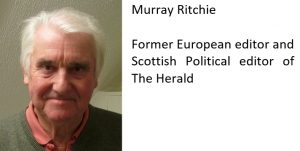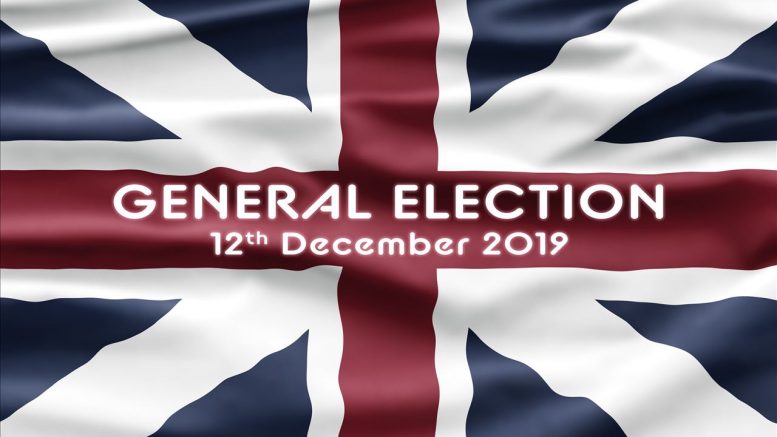Britain’s current agony will not be ended by the general election, whatever the outcome, far less by Brexit if it ever happens. In all probability the worst will be just beginning and could last for years, writes Murray Ritchie.
Brexit has laid such waste to British political, social and constitutional life that the wreckage is all around and too great to be repaired quickly. Was there ever a time when the people and their politicians were so bitterly divided?
Boris Johnson’s “deal” may pass in a newly constituted House of Commons – and woe betide the UK if we end up with no deal which is still possible – but negotiations between Britain and the European Union will only herald years of haggling. Those who glibly assume the post-Brexit future is rosy are in denial.
The EU is nowhere near prepared to give the UK any sort of deal which could be remotely construed as advantageous for fear of the obvious: sending the UK away rejoicing would merely invite a chain reaction and that is obviously why any demonstrable benefit to Britain is not going to happen. Oh, sure, Britain will disentangle itself from those bossy Brussels bureaucrats of Faragiste paranoia with their integrationist agenda but at what price this so-called independence?
The Britain that emerges with a trade agreement one day in the distant future – five years, seven, longer? – will be a much-changed country. Or a much reduced one. The Scots might well have left by then and rejoined the EU. The Northern Irish might return to the Dublin fold in some form of co-habitation and the Britain we know today might consist only of England and Wales (and maybe not even Wales eventually).
Even the very name Britain might be redundant. One pundit in London suggested the British rump nation of England and Wales should be renamed simply England. How would that go down in the valleys?
Latest estimates suggest a record 30 per cent or more will vote on December 12 for someone they don’t want. Voting to keep someone out instead of in is becoming normal.
The most obvious weakness in the political fracture in today’s Britain is the constitution, in as much as it exists. It has been more hindrance than help. Without a written constitution the UK has been shown up as a rarity in the modern world and in fairly urgent need of repair.
It could have been so different if only politicians had been true to their words. When five years ago the Scots were about to vote for or against independence the three major party leaders of the time – Messrs Cameron, Clegg and Miliband – offered a panic-driven “vow” offering a new constitutional deal to buy off Yessers.
The trick worked well enough to fend off secession, at least for a while, but the aftermath was somewhat soured when Cameron promptly announced on the morning after that it was now England’s turn for special constitutional attention. Evel – English votes for English laws – was the big idea but it was stillborn.
Today, Scottish, Welsh and Northern Irish MPs can (and often do) vote on English only affairs but English MPs are forbidden from voting in those areas now in the competence of the devolved nations. This is plainly a ludicrous circumstance and one which Gordon Brown recognised when he put some heft behind the No campaign in Scotland while he still carried influence.
Brown was credited with saving the Union after he called for Britain to become a federal state – shamelessly stealing old-time Liberal policy – but nothing has been heard of that idea since. It was never a terribly credible proposal, given that England has 84 per cent of the UK population. Talk of elephants in rooms does not cover it. So, an orderly constitutional rearrangement came to nothing – and now disintegration threatens.
And then there is the dear old House of Lords. None of their 800 or so Lordships is elected, plainly an absurd affront to democracy, one which successive governments keep threatening to resolve, and never do. Most of the hereditaries are gone, but life peers are now mostly – with some honourable exceptions offering specialised expertise – old party worthies and clapped out voting fodder. They must be the world’s most rewarded and underworked political nomenklatura.
At the last election 57 per cent voted against the Tories and the Democratic Unionist Party who ran the country.
And what of the electoral system? It helped cause this mess but changing it probably won’t cure Britain’s divisive politics. Yet the case for review is gaining support.
First past the post voting (FPTP) was always punted by its fans as the path to stable majority government. You voted, you confirmed or turfed out candidates, and we British looked down our noses at chaotic nations like Italy or Belgium with proportional representation (PR) who forced themselves into power-sharing and feuding coalitions.
Then along came years of governments with tiny majorities including Harold Wilson’s 1960s administrations. Remember Ted Heath begging the Liberals to join him in coalition? John Major’s crisis-plagued Cabinets during his Maastricht torture were the result of FPTP. Britain has just suffered three Tory administrations in succession struggling to command the support of the House of Commons. At the last election 57 per cent voted against the Tories and the Democratic Unionist Party who ran the country.
In the resultant mess it took judges, not politicians, to decide who was boss in the tussle between government and parliament as the unwritten constitution took a battering after the electoral system failed to provide a way out.
Even the United States is not immune from electoral injustice. Americans find themselves with an eccentric president who won fewer votes than his opponent but made it to the White House because of the federal delegate system. These blips serve only to underline the obvious fact that proportional representation, with all its faults, gives the people the governments they vote for even if rivals are forced to co-operate.
Coalition is sometimes worth the candle. Perhaps those foreigners with their pesky sense of fair play have a point.
To add to Britain’s Brexit fall-out we now face an election where there is predicted to be the highest ever level of tactical voting. All the parties are asking electors to “lend” them their votes to oust or stop an opponent.
The days when voters went to the booth to choose the candidate they actually want to win are passing into history. Latest estimates suggest a record 30 per cent or more will vote on December 12 for someone they don’t want. Voting to keep someone out instead of in is becoming normal.
All in all, today’s deep social and economic division and injustice, political stasis and constitutional confusion plus the looming horror of Brexit’s potential for years of pain offer nothing in the way of cheer. The general election won’t change that.
Merry Christmas? Sorry to disappoint.

Featured Image Credit: PhotoGranary/Shutterstock.com




